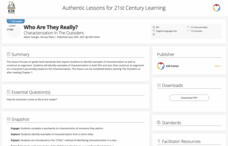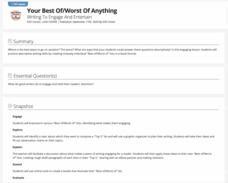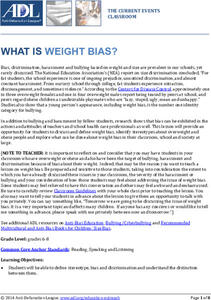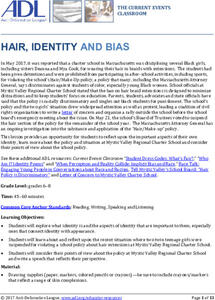K20 LEARN
Who Are They Really?: Characterization In The Outsiders
Ponyboy, Johnny, Winston, and Darry come alive in a lesson that focuses on the details S. E. Hinton uses to characterize the Greasers and the Socials. The class first observes the actors' words; the thoughts revealed their effect on...
K20 LEARN
Who's Coming To Dinner? Descriptive Writing
"The Dinner Party" is the anchor text in a lesson designed to encourage writers to use sensory details in their stories. After brainstorming descriptive words and phrases for the five senses, class members read Mona Gardner's stark tale...
K20 LEARN
Writing Is Elementary, My Dear Watson: Writing Paragraphs With Evidence And Reasoning
Did Smitty do it, or is he a victim? Sleuths apply their observation and reasoning skills to build a case for an argumentative paragraph. Class members closely observe a cartoon, make a claim, cite evidence from the image, and support...
K20 LEARN
Writing Wrongs Mini Lesson: Peer Editing And Revising
High schoolers draft a paragraph about their stance on the issue of school uniforms and share their work with a peer for editing. After watching a parody video about peer editing and revising, class members generate a "Top 10 list" of...
K20 LEARN
Your Best Of/Worst Of Anything: Writing To Engage And Entertain
It was the best of places! It was the worst of places! Middle schoolers practice their descriptive writing skills by creating an e-book about the best of/worst of topics. A series of activities about descriptive writing and worksheets...
K20 LEARN
Lord of the Flies Unit, Lesson 8: In The End
To end the unit, groups use the Honeycomb Harvest strategy to show connections among a character, symbols, and themes in the novel and then create an Anchor Chart for the character that includes a symbol that best represents him. They...
K20 LEARN
Lord of the Flies Unit, Lesson 7: Good To Be Bad
The seventh lesson in the Lord of the Flies unit asks scholars to consider whether or not an individual can overcome the worst thing they have ever done. Groups read different articles related to the question, share their expertise in a...
K20 LEARN
Lord of the Flies Unit, Lesson 4: Bad to the Bone
Is the nature of humans inherently good or evil? That is the question scholars consider in the fourth lesson plan of the Lord of the Flies unit. In a Four Corners activity, they examine statements about human nature and stand by the...
K20 LEARN
Lord of the Flies Unit, Lesson 6: I've Got The Power
Readers of Lord of the Flies consider the symbols of power William Golding uses in his dystopian novel and support their choice with evidence from the text.
K20 LEARN
Lord of the Flies Unit, Lesson 3: Behind the Mask
After watching a video about masks from many cultures, class members research the history of masks and build a Driving Question Board. Individuals then create a mask for a character from The Lord of the Flies, justifying elements of...
K20 LEARN
Lord of the Flies Unit, Lesson 2: Leader of the Pack
The second lesson plan in the Lord of the Flies unit asks scholars to consider the characteristics of a good leader. After generating a list of these qualities, they annotate a passage from the novel highlighting the leadership qualities...
K20 LEARN
Lord of the Flies Unit, Lesson 1: I'm A Survivor
What three readily available things would you grab in case of an emergency? That's the question that launches a unit study of William Golding's The Lord of the Flies. After sharing their choices, class members read Golding's rationale...
National Endowment for the Humanities
Frances Ellen Watkins Harper’s “Learning to Read”
Frances Ellen Watkins Harper's poem "Learning to Read" is the focus of a lesson plan that teaches middle schoolers how to do a close reading of a text. The lesson plan introduces them to a brief biography of the poet, includes a video...
Anti-Defamation League
Dealing with the Social Pressures that Promote Online Cruelty
Why do people engage in cyberbullying? What can be done about it? These are the questions middle schoolers consider in a very timely lesson. Participants view PSA announcements, read a case study, and participate in scenarios designed to...
Learning for Justice
Cliques in Schools
Band geeks, jocks, preppies; every school has its groups. Middle and high schoolers identify the various friendship groups and cliques in their school and consider these groups' positive and negative traits. After completing a Clique...
Anti-Defamation League
What Is Weight Bias?
After setting rules and expectations to create a safe place to share thoughts and feelings, scholars define the terms; stereotype, basis, and discrimination. Using a web brainstorm, learners list words associated with overweight and...
Learning for Justice
Looking Closely at Ourselves
A thoughtful discussion about self-reflecting leads to a conversation about skin color and making a list of words associated with "beauty." Budding artists use a mirror to examine their features and create a self-portrait. Peers critique...
Anti-Defamation League
Don't Let Hate Ruin the Fun: Youth and Online Games
Gamers unite! Take action against bullying and hate speech in online video games! After reading data that reveals the extent to which various age groups experience hate and, or harassment while playing video games online, groups develop...
Anti-Defamation League
Hair, Identity and Bias
Middle schoolers weigh in on dress codes, specifically those that apply to hair and make-up, with a lesson plan that uses a 2017 case from a charter school in Massachusetts. Class members read about two girls suspended for violating the...
Anti-Defamation League
Hair Discrimination and the CROWN Act
The CROWN Act (Creating a Respectful and Open World for Natural Hair) is the subject of the lesson that asks groups to research the stories of five different women and share their insights in a jigsaw activity. Participants then craft...
Anti-Defamation League
Teens, Tech, Connect: How Technology Impacts Teenagers' Friendships
To understand their time spent online, class members chart their use of technology during early morning hours, during school, after school, in the evenings, and on weekends. They then read several reports about how social media...
Anti-Defamation League
Bias, Bullying and Bad Behavior in the NFL
A 2014 case of locker room behavior in the National Football League offers high schoolers an opportunity to get involved in the conversation of bullying and abuse. Class members read about the case and analyze quotes that reveal...
Learning for Justice
Showing Empathy
A short social-emotional learning instructional activity teaches high schoolers how to show empathy toward others. After completing a short survey that has them assess their understanding of empathy, the class learns specific behaviors...
Learning for Justice
Standing Up Against Discrimination
Expert groups investigate five teens who stood up against discrimination they faced and then report their findings in jigsaw groups. The class drafts proposals for actions the school could take to stop discrimination.

























